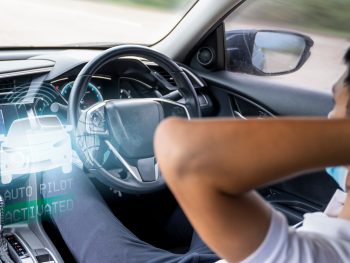Majority of UK drivers say they’re better than autonomous vehicles
UK drivers are yet to be convinced of the benefits, capabilities and reliability of autonomous vehicles despite major automaker and government investment in the technology.
Research from Volkswagen Financial Services (VWFS) has found 60% of motorists consider themselves to be a ‘better’ driver than an autonomous vehicle.
The study also reveals further doubts around the reliability of self-driving technology.
When asked what they felt would be the biggest disadvantage of fully automated cars, 39% of drivers expressed concerns about technological failings or mishaps. Meanwhile, one in 10 stated that non-active participation could lead to them ‘becoming bored’ on a driverless car journey.
And while over a quarter (27%) felt the technology would remove unsafe drivers from the roads, nearly one in three (30%) stated they did not think there was any significant benefit.
That’s despite the Government continuing with plans to invest up to £150m of funding into driverless vehicles by 2030, cementing the UK’s place “among world leaders for designing, developing, deploying, and manufacturing self-driving technologies, products and services”.
Meanwhile, the Automated Vehicles Bill has now passed through Parliament and is awaiting royal assent. Announced in the King’s Speech in November 2023, the bill will set the legal framework for the safe deployment of self-driving vehicles across Britain.
The SMMT has said the legislation will unlock a multi-billion-pound self-driving revolution. Its research suggests self-driving technology could save an additional 3,200 lives and prevent 53,000 serious accidents by 2040, providing a £38bn economic boost if self-driving passenger vehicles are deployed on UK roads.
But Renault Group has expressed some doubts this week about whether fully driverless technology will ever roll out globally for private cars as it rethinks plans. The French automaker said it would soon launch an ambitious level 4 offer for public transportation but would stick to providing assistance rather than autonomy for private cars.
While the group already offers driving assistance on most of its cars, it said further automation of some functions, with the aim of achieving complete vehicle autonomy, seems unlikely for the time being, “given current regulations, customer expectations and the cost of the complex technology involved”.
Volkswagen Financial Services UK said its own research shows the unwillingness that drivers have in handing over control of their vehicle.
Mike Todd, CEO, Volkswagen Financial Services UK, said: “As new driverless car technology continues to develop, and politicians move to create a legislative framework for rolling out autonomous driving solutions, it seems the public are yet to be fully convinced.
“Confidence in their own driving abilities, compared to self-driving technology, means some motorists will be reluctant to hand over control. While for others, the active participation in the driving experience is one they do not want to lose. Drivers also express worries about technology-related issues or failings when in the vehicle.
“However, when weighed against the predicted safety and economic benefits that autonomous driving will deliver, the argument for continuing to invest in the development of self-driving technology is compelling.
“With fully automated road journeys still a long way off, it will be interesting to see how the transition unfolds and whether, with time and more information, drivers will eventually get on board with the new automated driving technology offer.”


